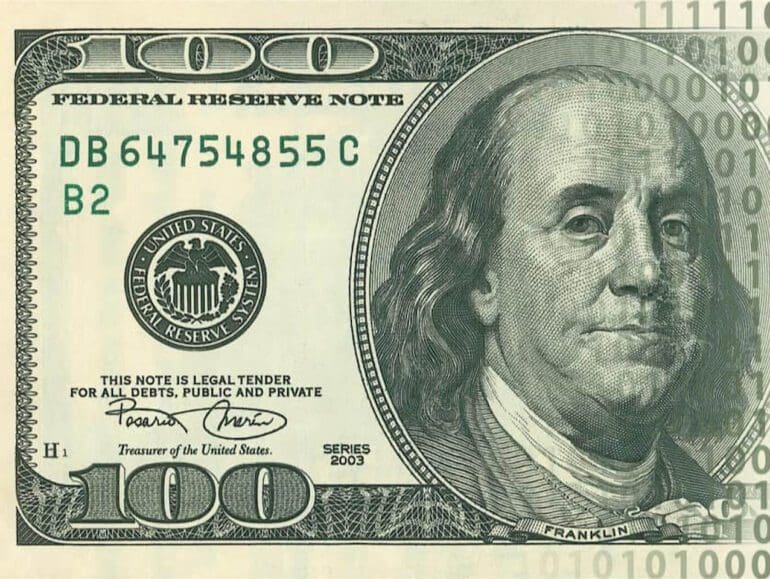Central Bank Digital Currencies (CBDCs) are, for many, divisive sources of controversy.
For some, they are a certainty in the digital world of the future and one of the only digital asset groups many have refused to condemn.

Split into retail and wholesale use cases, an argument has been made for their benefits. As well as facilitating efficient payments, particularly across borders, they are said to aid in cutting transaction costs, deter criminal activity and improve access to financial services for the many.
However, there are also concerns about the design of government-backed currencies, particularly for retail use. As well as the security threats to anything in the digital sphere, potential instability, and possible operational difficulties, the issue of privacy is front of mind in the debate surrounding CBDCs.
RELATED: CBDCs: The key to global financial inclusion?
In a recently published report from the American Enterprise Institute, titled, The Values of Money: Will Tyranny or Freedom Be in Your Digital Wallet?, Jim Harper and J. Christopher Giancarlo bring a magnifying glass to the privacy of CBDCs. Turning first to China’s e-CNY and then to the US’s future design, they call for a “freedom coin” to uphold US values and the Constitution.
“Doing so will give a US CBDC a distinct and decided advantage over CBDCs that incorporate government surveillance features,” they wrote. As part of its design, they suggest reevaluating the financial-crime law enforcement model, which they said could allow “American leadership to blossom” in the space.
China makes steps towards surveillance with the e-CNY
One of the leaders in developing a large-scale CBDC is China, which has already launched a pilot retail e-CNY in some regions and is testing wholesale applications.
Reports say that despite multiple pushes by the government to encourage retail usage of digital currency, circulation is poor. This is, of course, the country where the use of WeChat and Alipay is already prolific. It could take more than the launch of a government-backed currency for citizens to change their digital payment ways.
Regardless of its lack of success in the retail market, China’s CBDC is a forerunner, giving other governments a template of how the new currency could be designed.

Giancarlo and Harper warn of the design in the report: “A key purpose of the e-CNY is to give China’s government greater control over domestic commerce and visibility into the data it generates. The e-CNY bolsters the Chinese government’s power over finance.”
It tells of the authoritarian measures that the CBDC upholds, supporting the surveillance and control of citizens.
“The e-CNY will allow the Chinese government to link political conformity to individual prosperity and relegate political dissenters to poverty,” it continues. “This model of currency may be called a “surveillance coin.”
The premise for the use of CBDCs as tools of control and surveillance is not new. In other areas, privacy has been the most significant concern for many. In formulating draft legislation for the digital euro, the EU has said it is paying particular attention to maintaining privacy within its design.
Turning to the US and other democratic jurisdictions, Giancarlo and Harper call for creating a “freedom coin” as an alternative to China’s “surveillance coin.”
“China’s eCNY must not be allowed to set the terms of the world’s monetary and financial future,” the report reads. “The question for the free world is whether it will foster forms of digital currency—sovereign and non-sovereign—that counter surveillance coin with traditional liberal values such as protection for individual rights, personal privacy, the rule of law, free enterprise, and freedom from censorship.”
“Such a freedom coin would not merely be less subject to surveillance and censorship than a surveillance coin. It would be diametrically and robustly contrary to it.”
Given the recent movements of the US government against non-sovereign currencies and the general digital asset landscape, this desire perhaps verges towards wishful thinking.
Financial surveillance in the U.S.
The report then turns to an evaluation of the current state of financial surveillance in the U.S.
Looking at the Bank Secrecy Act and the heavily acronymized compliance measures banks must adhere to, Giancarlo and Harper likened the requirements of the current financial surveillance regime to a “velvet rope.” They started the suspicionless surveillance requirements employed by banks, turning the financial system into an “exclusive nightclub” for those with sufficient wealth and identity credentials.
“Financial surveillance excludes under-credentialed people around the globe,” the report states. “People who would benefit most from being able to transact, save, and invest through reliable financial institutions.”
“In a world of eight billion people, roughly a billion and a half often do not have access to financial services because they do not have identity documents good enough to satisfy financial surveillance requirements.”
Use of cash, while dwindling, is still used throughout the world as a necessity for many. Some concerns introducing a CBDC could leave people who rely on cash at an even more significant disadvantage.
In addition to the financial exclusion posed by financial surveillance requirements, they felt the requirements deliver significant amounts of data on citizens, collected “just in case” someone does something wrong, instead of in instances of probable cause. Furthermore, they stated it could come dangerously close to denying citizens their right to privacy and presumption of innocence.
“This financial surveillance “rope line” is increasingly anti-liberal and subject to abuse, even by governments of free societies,” reads the report. “It is taking democratic societies closer to the norms of closed societies than is socially acceptable to admit.”
A privacy-led solution – Intelligent Enforcement
The proposed solution to this “imperfect status quo” is a system that focuses on individual privacy in situations without probable cause.
To do this, Giancarlo and Harper suggested a system based on an analysis of big data, using pattern recognition and algorithmic methods to identify wrongdoing when it takes place.
Dubbing the approach “intelligent enforcement,” they proposed a system based on anonymized data until deemed suspicious. Using privacy-shielding technologies as the basis for a digital dollar, agencies could then be granted access to personal information and digital currency distributed ledgers, should suspicious activity arise.
In this way, they felt the system could embrace greater experimentation and innovation with digital asset technologies while upholding the pursuit of a more open and inclusive financial system. They felt this could set the U.S. CBDC apart as a truly democratic solution, which could increase global appeal, therefore positioning the nation as a modern financial leader in an ever more digital world.
Whether these ideals are prioritized in the eventual creation of the digital dollar could speak volumes about how the US financial system is headed.


